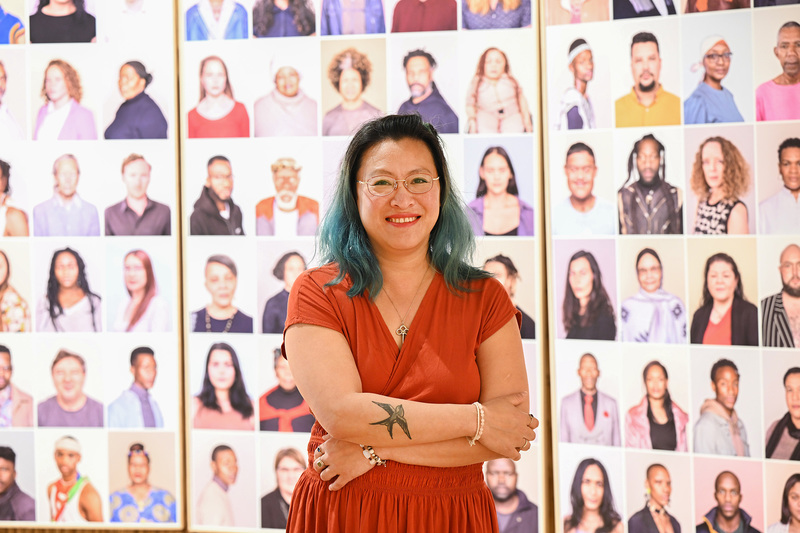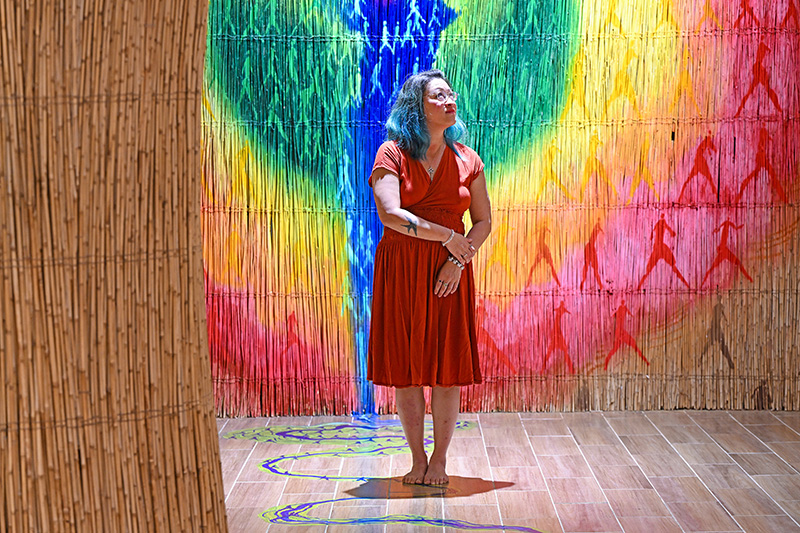UCT researcher’s work challenges colonial inheritance
02 May 2025 | Story Myolisi Gophe. Photos Lerato Maduna. Read time >10 min.
In a world increasingly preoccupied with who belongs and who decides, University of Cape Town (UCT) PhD graduate Eve Wong’s work on identity, marginality, and speculative future-crafting is reimagining not just the past, but the possibilities ahead.
Drawing from personal experience and academic rigour, Dr Wong, who moved from Taiwan to the United States (US) at age five, describes a lifelong preoccupation with navigating layered identities. “Questions around how people make sense of themselves – who they are, where they’re from – have always been both intellectual and deeply personal,” she said.
Wong’s doctoral research in anthropology, which she graduated with during UCT’s autumn graduation season, centres on the Khoisan Revivalism movement in South Africa, exploring how young, urban, working-class individuals reclaim erased histories and challenge fixed notions of race and authenticity. But more than a case study, her work is a bold theoretical intervention.
UCT News conducted a question-and-answer interview with Wong to delve into her research.
Myolisi Gophe (MG): Your work explores identity, marginality, and speculative future-crafting. What initially drew you to these themes?
Eve Wong (EW): The speculative future-crafting is an idea that emerged during the work rather than it being something preceding. As for identity and marginality, I think I’ve always been interested in those matters. As a minority across multiple domains for most of my life, and as someone who moved from Taiwan to the US at five years old, I’ve always had to carry multiple identities and navigate other people’s assumptions about my identity(ies). Questions around how people make sense of themselves, who they are, where they’re from and how they became the people they became had always been questions that were both intellectual but also deeply personal.
MG: Your dissertation challenges fixed ideas of identity. How do you see the role of movement, disruption, and emergence in shaping identity today?
EW: I don’t think identities have ever been “fixed”. I think that’s a lie of Empire and the entire line of thinking flowing through from the earliest classical Greek philosophers all the way through the Enlightenment and the “scientific revolution”. It’s reductionist but easier to handle when one considers identity as an object rather than a field or an endless unfolding. I believe that identity has always been in motion, in disruption, in a perpetual process of emergence. In other words, identity is not a thing we possess nor is it possessable. It arises relationally, emerging through our interactions with others.
“I approach identity as a recursive unfolding that makes and unmakes itself over and over again.”
MG: Can you explain how the concepts of sincerity, stickiness, and fabulation help us rethink identity beyond colonial erasure?
EW: Sincerity shifts power away from authenticity and, importantly, the levers of legitimisation that depend on colonial institutions to “authenticate” and thereby “bestow” the rights to exist upon a marginalised people. Stickiness describes the modes where sincerity is not enough. The grind between effort and limit, while restrictive and constricts the full and free expression of individual creative urge, it also produces the kind of friction that can generate unexpected innovation in identity processes that can, as [Gilles] Deleuze would say, escape the over-coding machine. And lastly, fabulation is the last piece. It is the unexpected innovation, the creation, the remaking and remything of self as a member of a people that (re)coheres what Empire fractured.
MG: How does your work engage with or critique traditional postcolonial studies?
EW: Most postcolonial studies adopt ideas about a “before” colonialism and an “after” colonialism to describe what was lost or disrupted. I inherently don’t look at identity through a linear lens. I approach identity as a recursive unfolding that makes and unmakes itself over and over again.

MG: You draw on thinkers like Sara Ahmed and Gilles Deleuze. How have their ideas shaped your understanding of marginality?
EW: I would say that my work, while ostensibly on marginality, has as more of its interest what Deleuze called the “missing people”. Or even Ulf Hannerz’ idea that the centre and the periphery are not set – the periphery eventually becomes the centre and something else becomes the periphery. In other words, I see marginality not so much as a condition but more as a position, which is better described through Deleuzian “missingness”. Sara Ahmed discusses marginality through stigmatised affective terms as “stuck” to people which is something I use to think about how “stickiness” can impede or facilitate affective movement.
MG: Your dissertation focuses on the Khoisan Revivalism movement. What were some of the most surprising findings from your research?
EW: I don’t know if it’s surprising, exactly, but the finding that the core tension seems to be what I called a suspension between fear and desire. The desire to be legitimised, validated, “authenticated” by formal and official institutions that are inherently colonialist. While a fear of being rejected or refused recognition or to be unauthenticated makes sense, what was surprising is that there was also a subtle fear of being authenticated and recognised. Because formal recognition could translate to their identity being legislated and brought under colonial structures and definitions anew.
MG: How do young, urban, and working-class Khoisan-identifying individuals navigate cultural sincerity and political disengagement?
EW: They just... do? While it may look inherently political looking at it from the outside, from their own internal sense of themselves and their lived and embodied experience, they are merely doing life, embracing their Khoisanness and have no interest in politicising or being politicised.
“They are merely doing life, embracing their Khoisanness and have no interest in politicising or being politicised.”
Many of us already inhabit this contradiction. Not everyone who chooses to buy local is having an internal monologue about the impending ecological collapse and have a definitive stand on climate change and the need to minimise their carbon footprint while paying for a punnet of strawberries at the till.
MG: In what ways do Khoisan revivalists challenge essentialist notions of race, mixedness, and authenticity?
EW: I think that tracing the historical developments of “coloured” and “Khoisan” highlights the falsity of such identities and yet, emphasises the power of these falsities, which fall exactly into Deleuzian arguments about fabulation – that fabulation is imbued with the powers of the false wherein the “power” is nothing more or less than the power to create “truth”. In this way it challenges the idea that any notion of race or social identity is anything other than just another fabulation. The core question stops being around “How do we define [identity]?” and shifts to what I think is much more interesting: “What does it do?” for one thing and for another, “What can it do?” In other words, if we can fabulate truth, can we fabulate better futures that rebuild people in ways that better serve social justice and repair?
MG: Your work positions “sincerity” as central to identity formation. How does sincerity function differently in marginalised communities compared to dominant identity discourses?
EW: Dominant identity discourses are fixated upon authenticity, legitimacy, and is always seeking proofs and debunking. This model requires flattening and does not survive in plurality. Marginalised communities necessarily live in multiple, fragmented selves and identities. Authenticity becomes a fraught and difficult space in which their “realness” and truth of self becomes subservient to the hegemonic order, which threatens to strip their identity from them with the stroke of a pen from a lawmaker in governing bodies in which they are not represented. Sincerity allows for them to make claims and insist upon their own “realness” on their own terms in ways that are not dependent on external authenticators to be true.
MG: How do legal frameworks, state policies, and traditions shape or constrain Khoisan identity today?
EW: My dissertation was not focused on the legal situation or condition of Khoisan identity and people as I was more interested in the affective, cultural, and psychological rather than the legal or political.
MG: Your research suggests that marginality is not just about exclusion but also about creative world-making. Can you expand on this idea?
EW: Marginality or perhaps we could say “missing people” is about exclusion, sure, and therefore by definition, there are gaps, holes, absences. Their histories are not written by themselves, their voices are lost, and they are effaced and erased in the archives. The gaps and the “missingness” are where fabulation occurs and new possibilities can be generated.
MG: How do you see the Khoisan Revivalism movement evolving in the coming decades?
EW: I don’t know. And I think the open-endedness is exciting because it represents possibility and potential for new innovations that furthers the decolonisation project in South Africa.
MG: How can your research contribute to broader conversations about identity and belonging in postcolonial societies?
EW: I would love to see a shift away from authenticity models of reckoning identity to legitimise any marginalised community’s right to exist.
MG: Your work bridges academia with UI/UX design and digital humanities. How do you see technology influencing identity politics in the future?
EW: That is kind of where I’d like to move to next. I don’t know if it’s exactly identity politics as we’ve reckoned with it, but it is a challenge to the identity of “human” as the standard-bearer and rubric necessary to be considered “intelligent” and therefore deserving of ethical treatment. To consider what it might look like if we extended decolonisation beyond human beings. If once humans decided “if you don't look like us or talk like us, you’re not ‘human’ and we can destroy and extract”, what might the future look like if we moved beyond this same rhetoric in relation to other forms of emergent intelligences?
 This work is licensed under a Creative Commons Attribution-NoDerivatives 4.0 International License.
This work is licensed under a Creative Commons Attribution-NoDerivatives 4.0 International License.
Please view the republishing articles page for more information.










